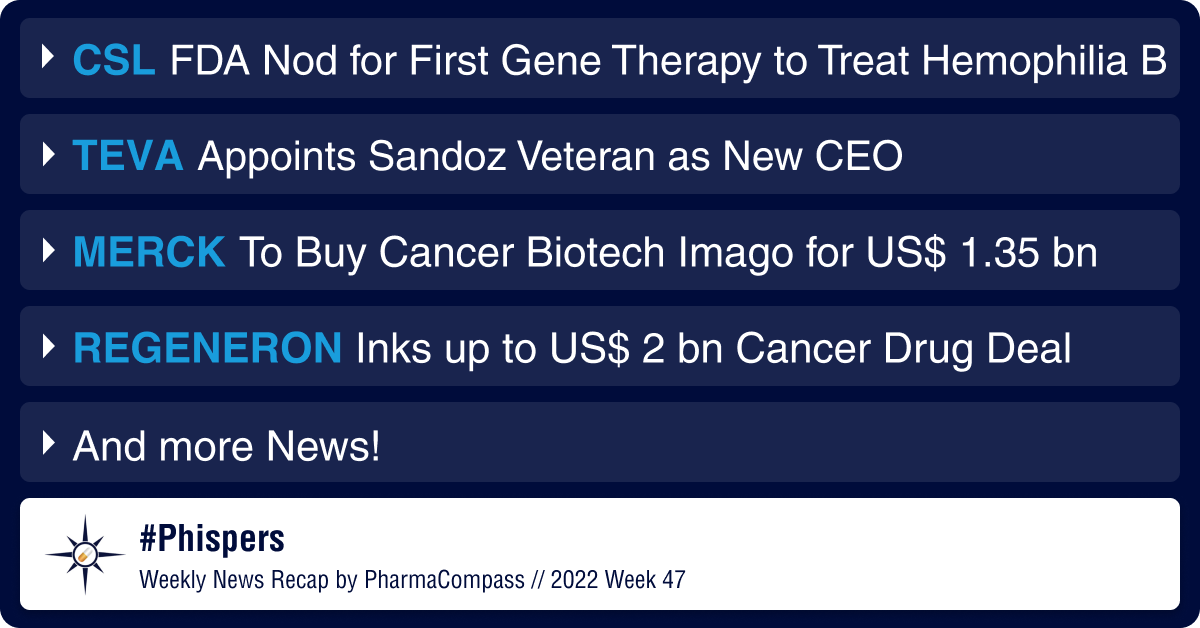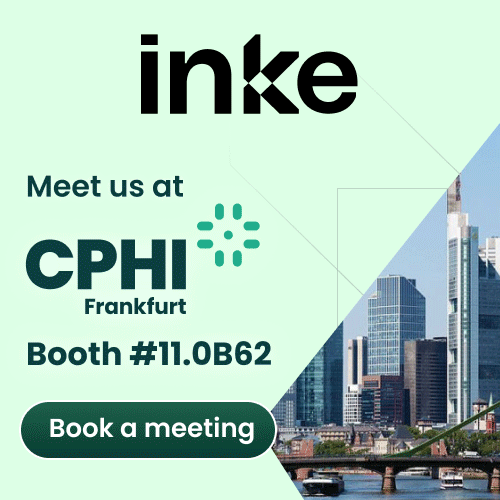
By PharmaCompass
2022-11-24
Impressions: 3,114
The US Food and Drug Administration (FDA) has approved Australian drugmaker CSL’s gene therapy as the first treatment for hemophilia B. At US$ 3.5 million a dose, this one-time therapy has become the world’s most expensive treatment, replacing bluebird bio’s Skysona. In yet another first, Provention Bio’s injectable drug Tzield (teplizumab) has been approved in the US as a preventive treatment for type 1 diabetes in individuals aged eight years or older who are in stage 2 of the disease.
This week, Teva Pharmaceutical appointed former Sandoz chief Richard Francis as its next CEO. Francis will take charge on January 1.
In M&A news, Merck will acquire cancer drug developer Imago BioSciences for US$ 1.35 billion in a bid to expand its portfolio of blood disorder treatments. Regeneron has inked a potential US$ 2 billion deal with CytomX Therapeutics to co-develop next-generation bispecific cancer treatments.
After GSK’s Zejula, the FDA has requested Clovis Oncology to limit the indication of its PARP inhibitor Rubraca (rucaparib) as second-line maintenance therapy in recurrent ovarian cancer. This will limit Rubraca’s use to only patients harboring tumor BRCA mutations. And GSK has decided to stop selling its blood cancer drug Blenrep in the US after it flunked a phase 3 trial for relapsed or refractory multiple myeloma.
In regulatory news, a majority of warning letters issued this year for violation of good manufacturing practices (GMPs) emanated from onsite inspections, reversing a pandemic-era trend, an FDA official has said. The US agency has issued a Form 483 with 10 observations to Aurobindo Pharma’s Unit-IX, an intermediate facility in the Indian state of Telangana.
In other big news, about 12 of the top 18 pharmaceutical companies in the US have cut their spending on Twitter to zero. And, a US judge has sentenced Theranos founder Elizabeth Holmes to over 11 years in prison for defrauding investors.
At US$ 3.5 million, CSL’s Hemgenix becomes world’s most expensive therapy
Back in September, bluebird bio’s gene therapy Skysona (eli-cel) had emerged as the most expensive treatment at US$ 3 million when it bagged FDA approval. This week, the agency approved a one-time gene therapy from Australian drugmaker CSL — Hemgenix — as a treatment for hemophilia B. The treatment will cost US$ 3.5 million, and has now ousted Skysona as the world’s most expensive medicine.
Hemophilia B is caused by missing or low levels of a protein called factor IX that helps the body effectively clot blood. Hemgenix is the first gene therapy to treat the rare genetic blood clotting disorder. It consists of an engineered virus carrying a gene expressed in the liver to produce clotting factor IX. Data from a study found that the treatment raised factor IX levels over 18 months and cut the number of bleeding events over a year by 54 percent. It also freed 94 percent of the patients from costly infusions of factor IX.
Originally developed by Dutch biotech UniQure, CSL had bought the rights to the drug in 2020 for an upfront payment of US$ 450 million.
Meanwhile, the FDA has raised questions about Iovance Biotherapeutics’ cell therapy, thereby upsetting the company’s filing plans yet again. This is the latest in a three-year streak of delays. The company had begun a rolling biologics license application (BLA) filing in August. Iovance now plans to address those comments and complete its filing in the first quarter of 2023.
Japan grants emergency approval to Shionogi’s Covid-19 oral pill: Japan’s health ministry has granted an emergency approval to Shionogi’s Covid-19 drug Xocova (ensitrelvir), making it the first domestically developed oral pill to treat patients with mild symptoms of coronavirus. The drug is the first to be approved under Japan’s emergency regulatory approval system. Shionogi has signed an agreement to sell about a million doses to the Japanese government. It is now planning to have its antiviral pill approved in the US.
Provention’s Tzield becomes first-of-its-kind drug in US to treat type 1 diabetes
A year after being rejected, Provention Bio’s Tzield (teplizumab) has won an approval from the FDA as a preventive treatment for type 1 diabetes in individuals aged eight years or older who are in stage 2 of the disease. The injectable drug is the first treatment in the US to delay progression of the autoimmune disease.
The agency’s approval is based on data from a 2019 study that showed patients on Tzield, on an average, progressed from stage 2 to stage 3 25 months later than those on placebo. Tzield is part of a class of drugs known as anti-CD3 therapies that bind themselves to certain white blood cells to suppress the body’s immune response.
In October, Provention had signed a co-promotion deal with Sanofi, offering the French drugmaker first negotiation for exclusive global rights to commercialize the drug in exchange for an upfront payment of US$ 20 million. Originally developed by MacroGenics, Provention bought the rights to the drug in 2018. Tzield will be sold at a price of US$ 13,850 a vial, with a 14-vial regimen costing US$ 193,900 at list price.
Lilly’s insulin drug scores interchangeability tag: The FDA has approved Eli Lilly’s long-acting insulin — Rezvoglar — as an “interchangeable” product with Sanofi’s Lantus (insulin glargine). The “interchangeable” tag means Rezvoglar can now be directly substituted by pharmacists for Lantus. Rezvoglar has become the second insulin biosimilar to receive the designation after Viatris and Biocon’s Semglee received the tag in July 2021. FDA had approved Rezvoglar as a biosimilar to Lantus in December 2021. Meanwhile, Lilly said it plans to double the manufacturing capacity for its type 2 diabetes drug Mounjaro by 2023-end.
FDA grants priority review to Takeda’s dengue vaccine: FDA has granted priority review to Takeda’s BLA for its dengue vaccine candidate, Qdenga (TAK-003). The vaccine, which received its first worldwide approval in Indonesia three months ago, will be evaluated for its ability to prevent people between the ages of four and 60 years from contracting any of the four serotypes of dengue. Sanofi’s Dengvaxia was the first dengue vaccine to be approved in the US in 2019, but its usage is severely restricted.
Teva gets new CEO; Schultz to be replaced by former Sandoz chief Richard Francis
Teva Pharmaceutical has appointed former Sandoz chief Richard Francis as its next CEO. Francis will take over on January 1, replacing Kåre Schultz, who has served in the role since 2017.
Francis, who currently heads gene therapy firm Purespring Therapeutics and biopharma company Forcefield Therapeutics, will also take on the role of Teva’s president. Francis has a long background in the pharmaceutical industry. He had worked at Sanofi and Biogen before joining Novartis’ generics division. Francis headed Sandoz for five years, from 2014 to 2019.
Meanwhile, Teva has said it plans to significantly increase the production of biosimilars in the coming years. Teva and Sandoz are targeting top-selling biologics, such as AbbVie’s arthritis drug Humira. According to industry estimates, over 55 blockbuster biologic drugs will lose validity of their patents by the end of the decade. Teva plans to corner 10 percent of the global biosimilars market share.
Merck buys cancer biotech Imago BioSciences for US$ 1.35 billion in cash
This week, Merck announced it will acquire cancer drug developer Imago BioSciences for US$ 1.35 billion in a bid to expand its portfolio of blood disorder treatments. The drugmaker has offered US$ 36 per share in cash to Imago.
California-based Imago develops drugs for the treatment of bone marrow-related diseases. Its lead drug — bomedemstat — is currently undergoing mid-stage studies for treating certain types of rare blood cancers. The companies expect to close the transaction in the first quarter of 2023.
In another cancer-related news, Merck’s blockbuster drug Keytruda and chemotherapy combo has met the primary goal in a phase 3 study for treating gastroesophageal junction adenocarcinoma, a type of gastric cancer.
Regeneron inks up to US$ 2 billion cancer drug deal with CytomX: Regeneron has inked a potential US$ 2 billion deal with CytomX Therapeutics to co-develop next-generation bispecific cancer treatments. As part of the deal, the New York-based pharma will pay CytomX US$ 30 million upfront to work on dual-acting antibody cancer therapies. CytomX has a chance to further receive up to US$ 2 billion in clinical and commercial milestones.
Novo to invest US$ 744 million in Denmark: Novo Nordisk will invest 5.4 billion Danish Kroner (US$ 744 million) to expand its existing facilities at Bagsværd in Denmark. The investment will also include the construction of a new plant. The Danish pharma giant said the project is expected to be finalized in 2024 and create about 160 new jobs. The investment will add capacity in research and development for manufacturing active pharmaceutical ingredients (APIs).
Meanwhile, Fujifilm is investing US$ 188 million to build a cell culture media manufacturing site at the Research Triangle Park in North Carolina. This will be the second manufacturing facility in the US and the fifth manufacturing facility globally for Fujifilm Irvine Scientific, a subsidiary of Fujifilm. The 250,000-square-foot site will produce dry powder and liquid media.
After GSK, FDA asks Clovis to limit the indication of its PARP inhibitor Rubraca
On FDA’s request, GSK had recently said it will stop selling Zejula for some ovarian cancer patients whose disease is stable after a second line of chemotherapy. Now, the FDA has requested Clovis Oncology to limit the indication of its PARP inhibitor Rubraca (rucaparib) as second-line maintenance therapy in recurrent ovarian cancer. This will limit Rubraca’s use to only patients harboring tumor BRCA mutations. Clovis said it is evaluating FDA’s request. The FDA plans to convene a meeting of its advisory committee to review the matter if Clovis doesn’t revise the indication voluntarily.
GSK to stop selling blood cancer drug in US: Earlier this month, GSK’s Blenrep (belantamab mafodotin) had flunked a phase 3 trial for relapsed or refractory multiple myeloma. Following the trial failure, the British drugmaker has decided to stop selling the blood cancer drug in the US. The pharma has begun the process to withdraw Blenrep’s marketing authorization in the US, but said the drug’s trial programs will continue. Access to Blenrep will not be hampered in other countries, including the European Union.
Most drug GMP warning letters in FY2022 were issued post onsite inspections: FDA
A majority of warning letters issued for drug good manufacturing practice (GMP) violations in FY 2022 resulted from onsite inspections, reversing a pandemic-era trend, an official of the FDA has said.
Jeffrey Meng, program division director, Division of Pharmaceutical Quality Operations III, Office of Regulatory Affairs, said the agency issued 62 warning letters and 23 import alerts in FY 2022. About 42 or 67.7 percent of the warning letters were issued following onsite inspections. Another 16 (25.8 percent) were from inspecting samples and four (6.5 percent) were the result of a records request. In FY 2021, the pandemic had halted many inspections, resulting in fewer warning letters being issued following onsite inspections. Meng said onsite inspections are the “gold standard” as they allow “a more holistic snapshot of a firm’s operations.”
Aurobindo’s Indian facility hit by FDA’s Form 483: The FDA has issued a Form 483 with 10 observations to Aurobindo Pharma’s unit-IX, an intermediate facility in the Indian state of Telangana. The agency had carried out an inspection of the facility at Gundlamachnoor village in Sangareddy district from November 10 to 18.
After fake Lilly tweet, top drugmakers in US halt ad spending on Twitter
Recently, Eli Lilly had halted Twitter ad spending after a fake tweet wiped off billions from its market cap. Now, a majority of the drug industry’s biggest advertisers have followed suit.
Around 12 of the top 18 pharmaceutical companies in the US have reduced their Twitter ad spending to zero, according to a report by Pathmatics, which tracks data on prescription drug ad spending and general corporate advertising. Apart from Lilly, the list includes Merck, AstraZeneca, Novartis and Pfizer.
Theranos founder sentenced to over 11 years in prison for defrauding investors
In January this year, a US jury had found Theranos founder Elizabeth Holmes guilty of defrauding investors, convicting her on four counts. Now, a federal judge has sentenced Holmes to 11 years and three months in prison for defrauding investors in her failed blood-testing start-up that was once valued at US$ 9 billion. The prison term will be followed by three years of supervised release. The court has ordered Holmes to surrender by April 27, 2023.The PharmaCompass Newsletter – Sign Up, Stay Ahead
Feedback, help us to improve. Click here
Image Credit : Phisper Infographic by SCORR MARKETING & PharmaCompass license under CC BY 2.0
“ The article is based on the information available in public and which the author believes to be true. The author is not disseminating any information, which the author believes or knows, is confidential or in conflict with the privacy of any person. The views expressed or information supplied through this article is mere opinion and observation of the author. The author does not intend to defame, insult or, cause loss or damage to anyone, in any manner, through this article.”







